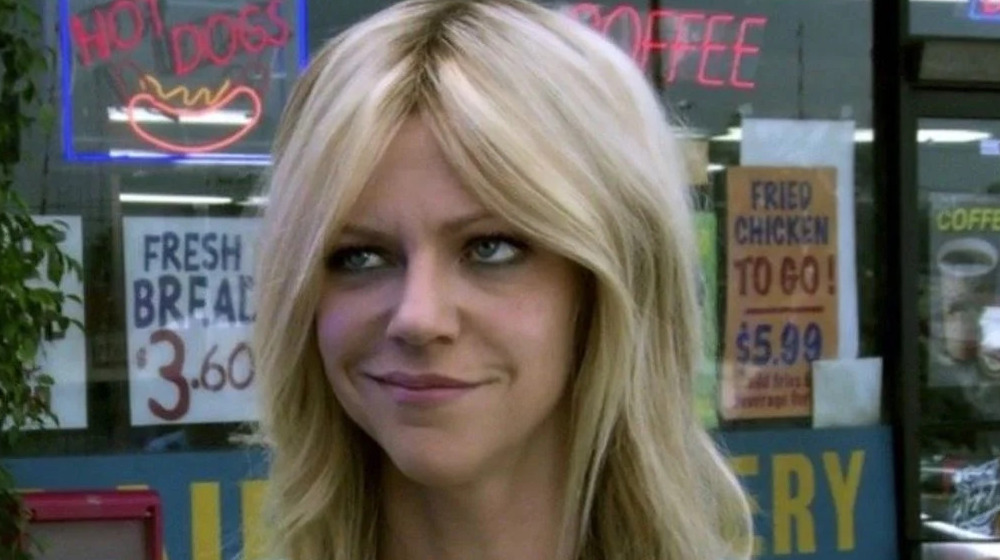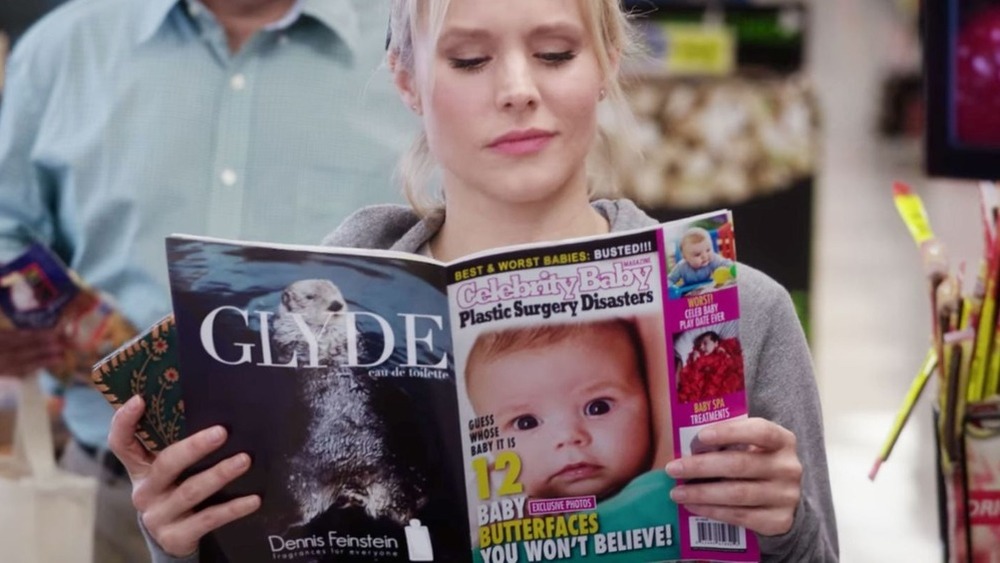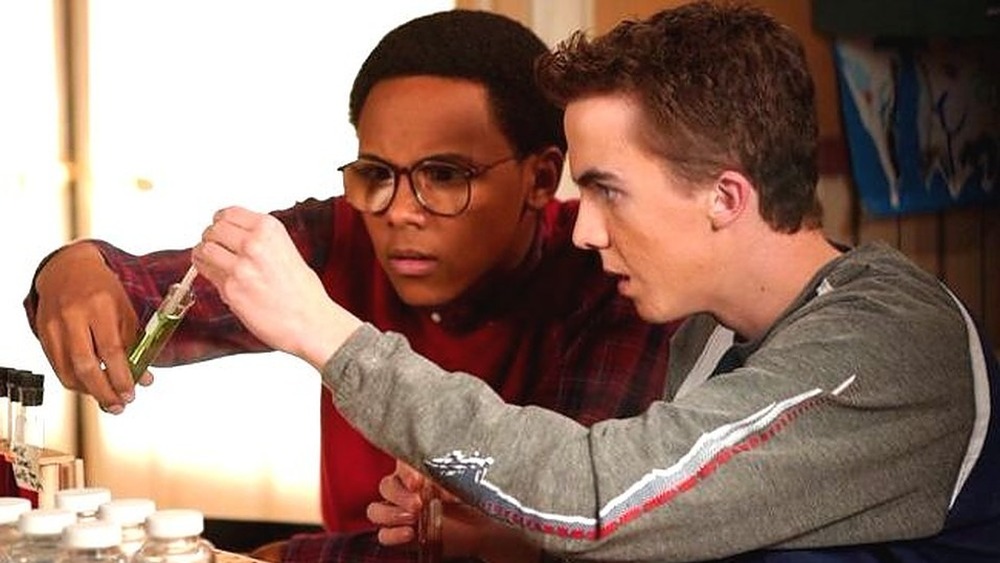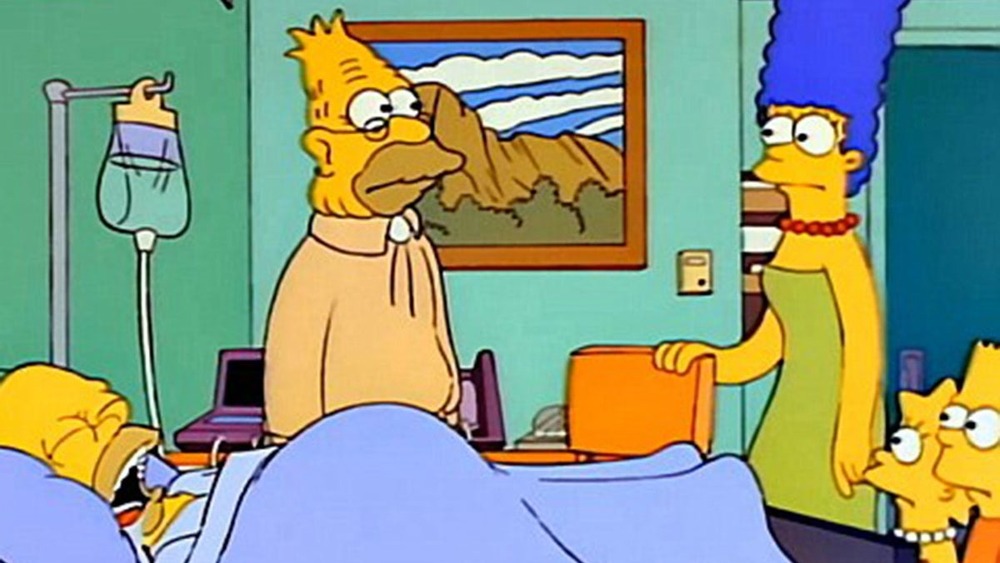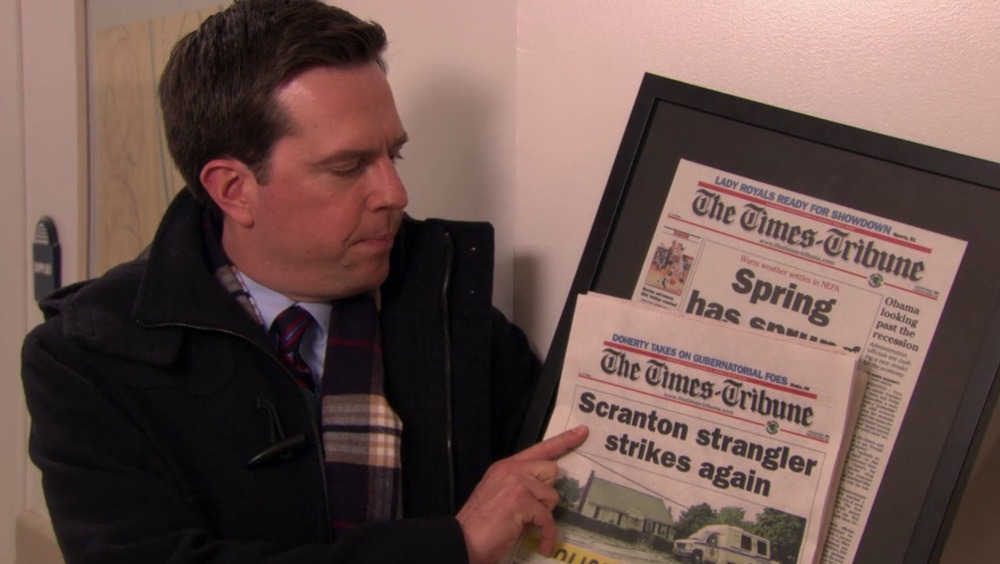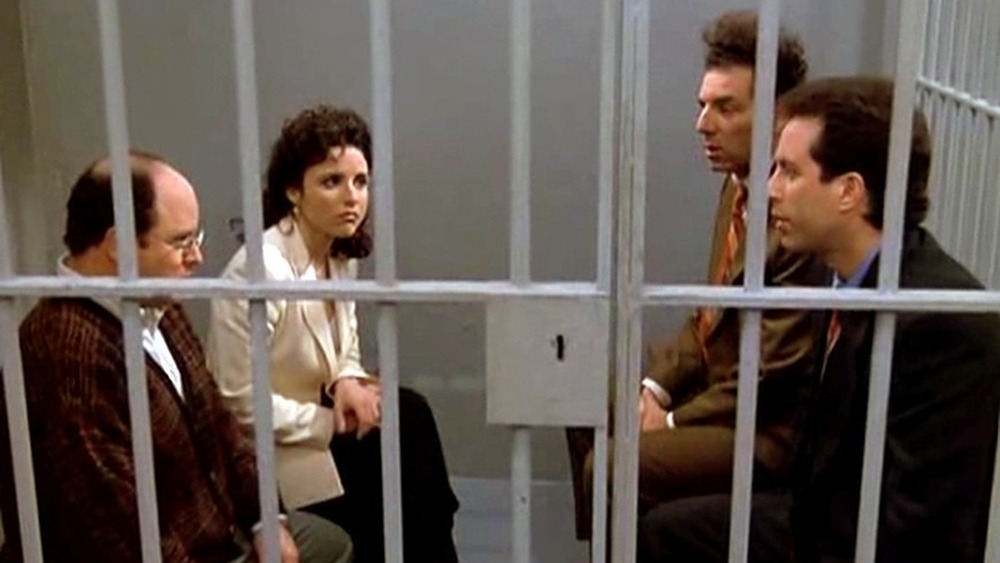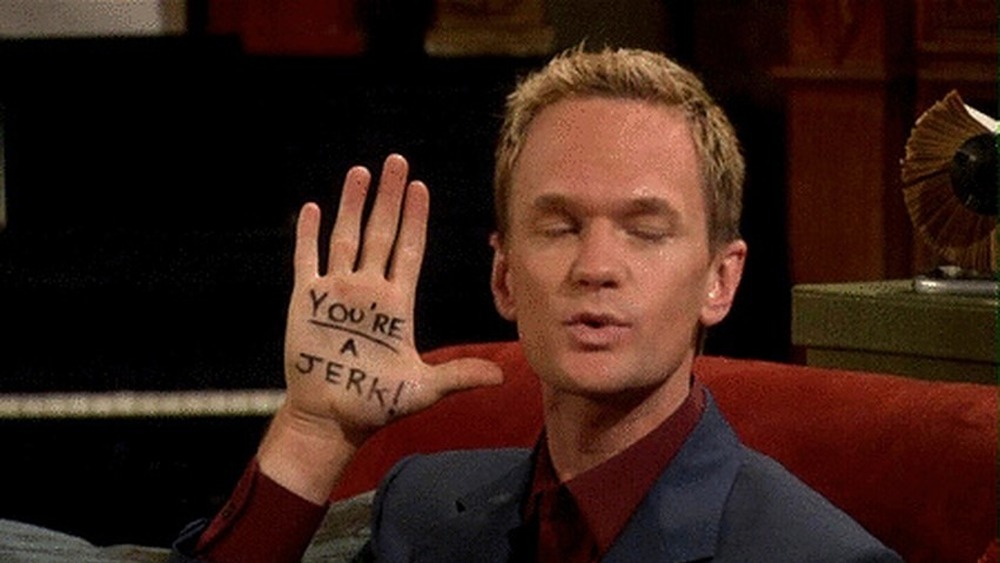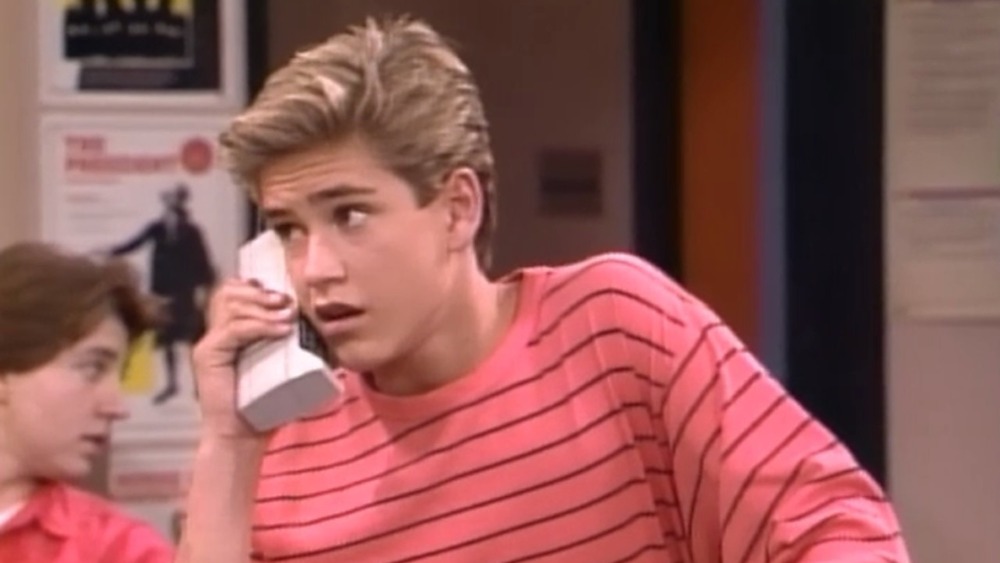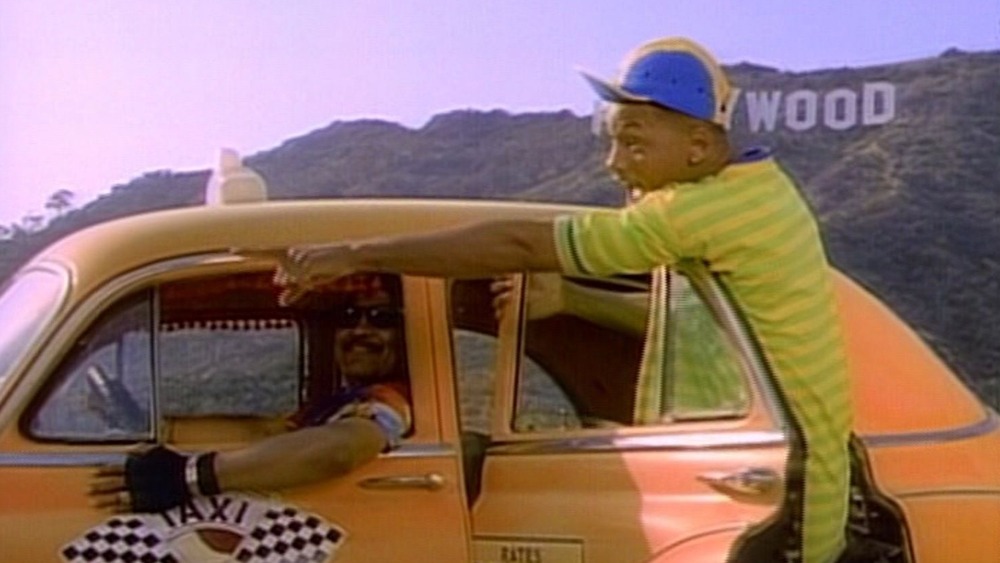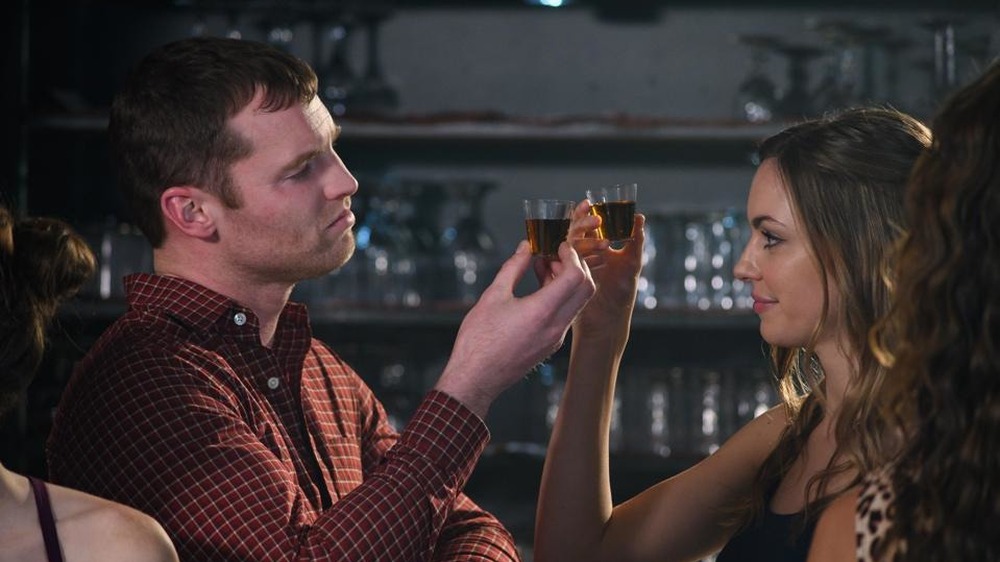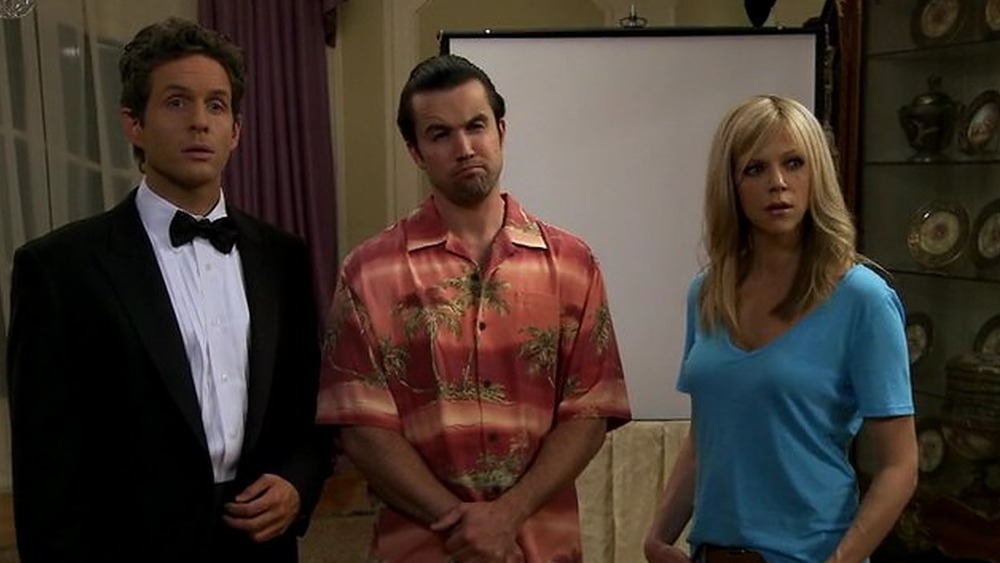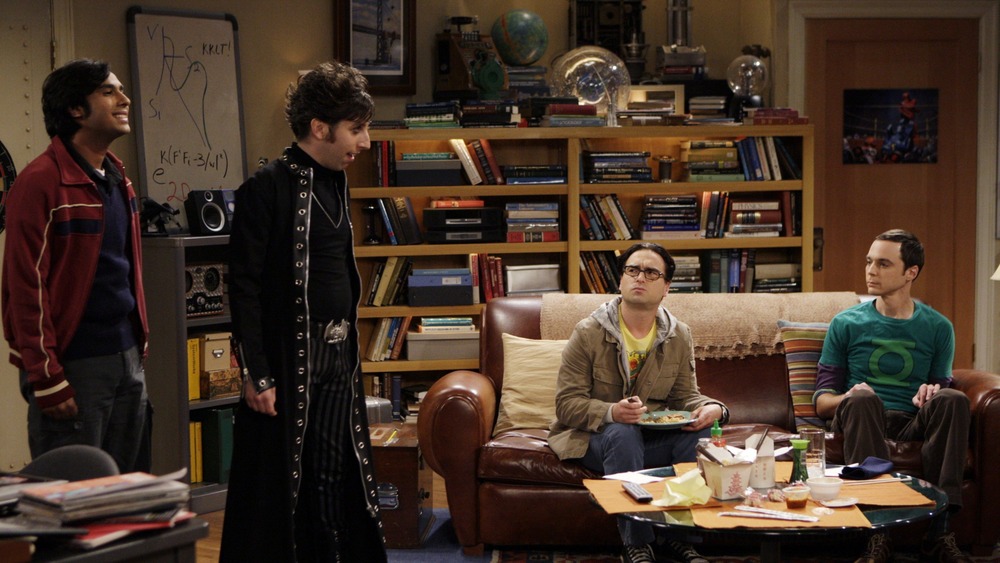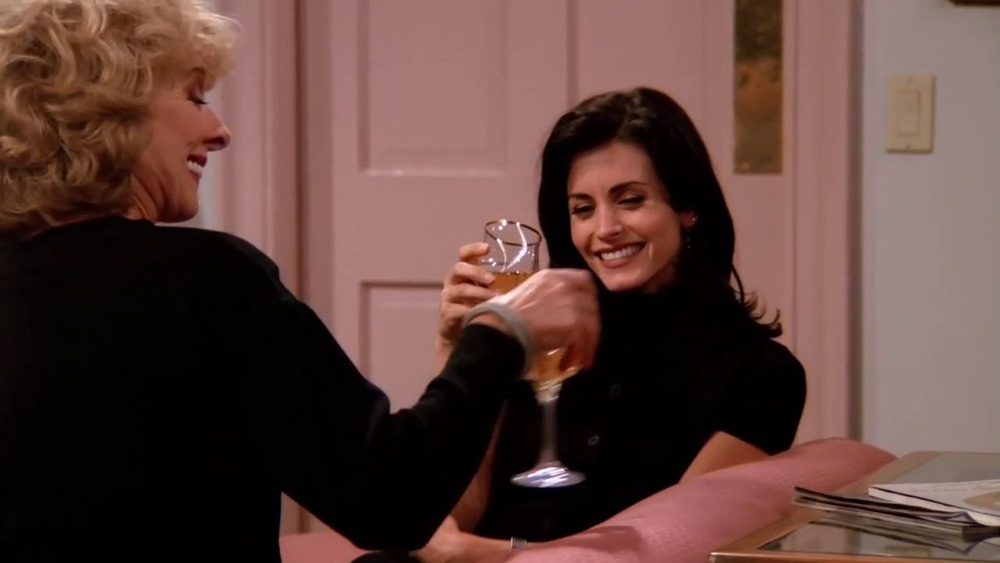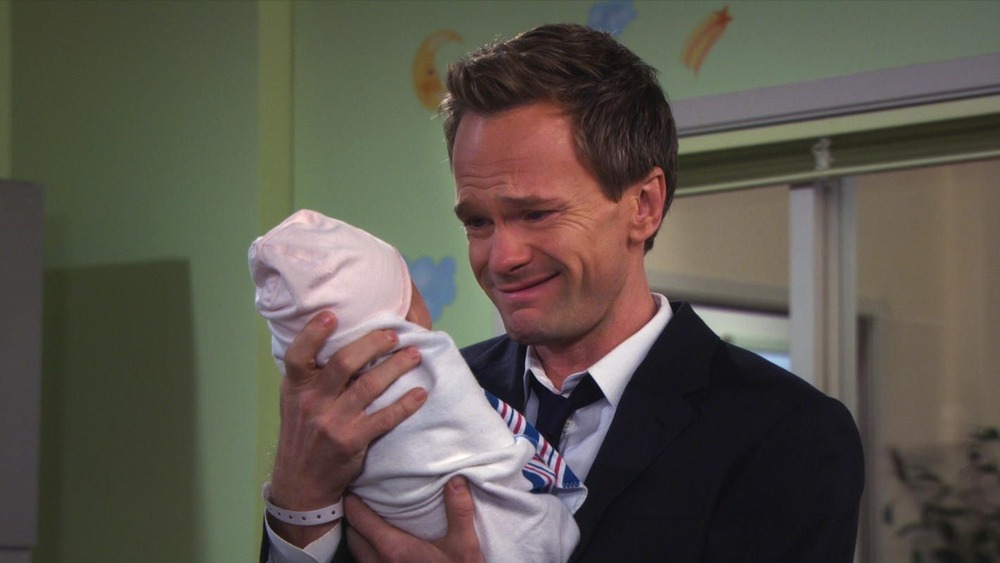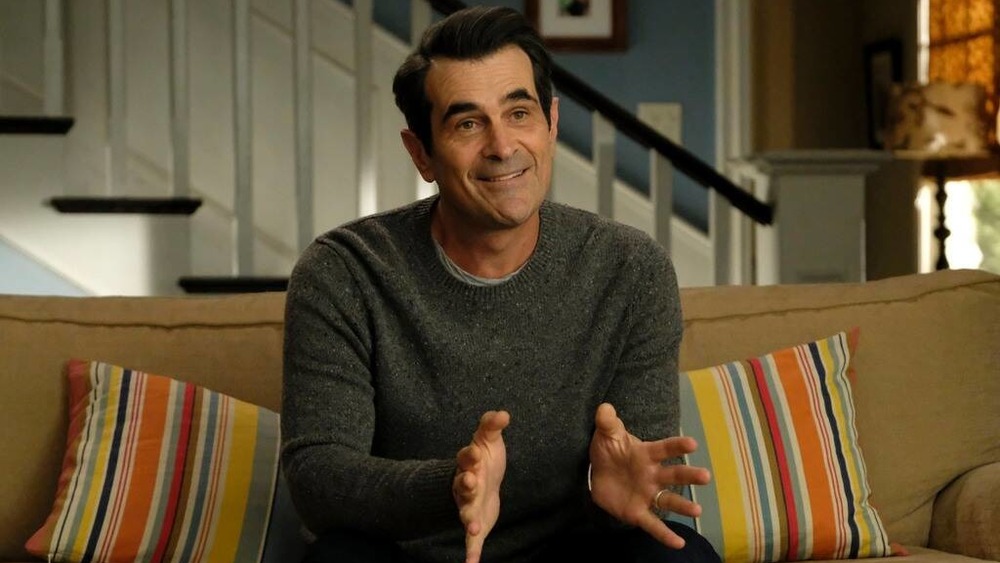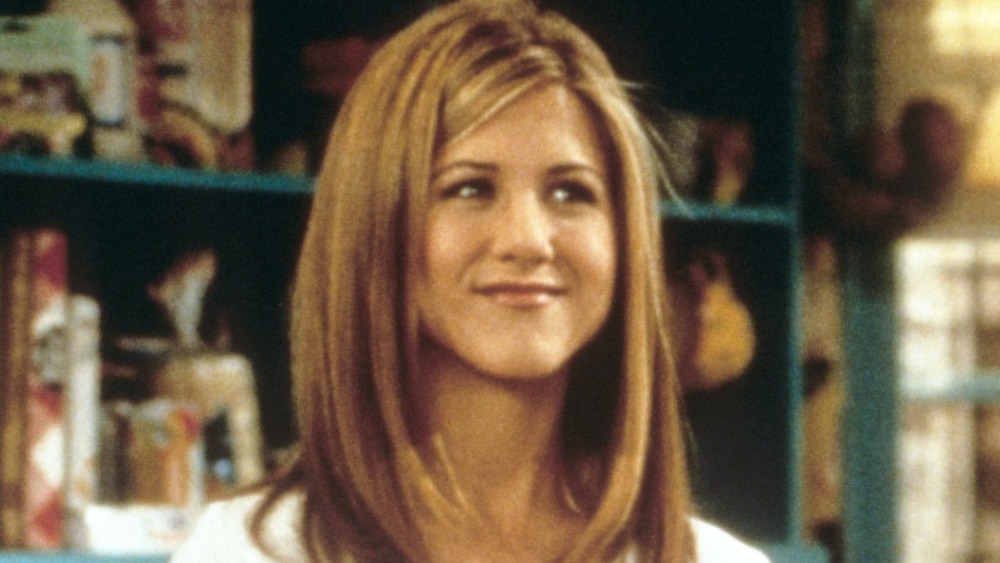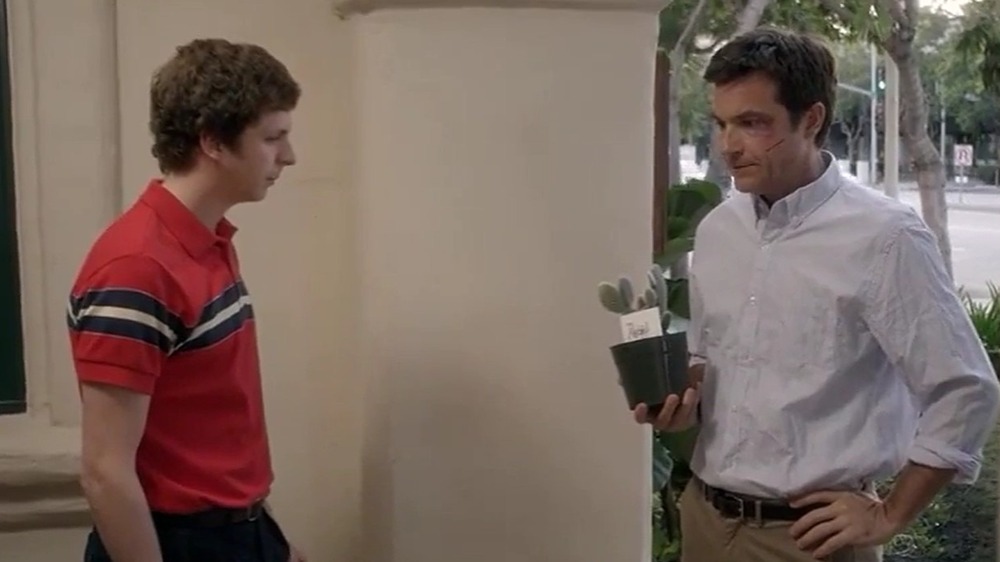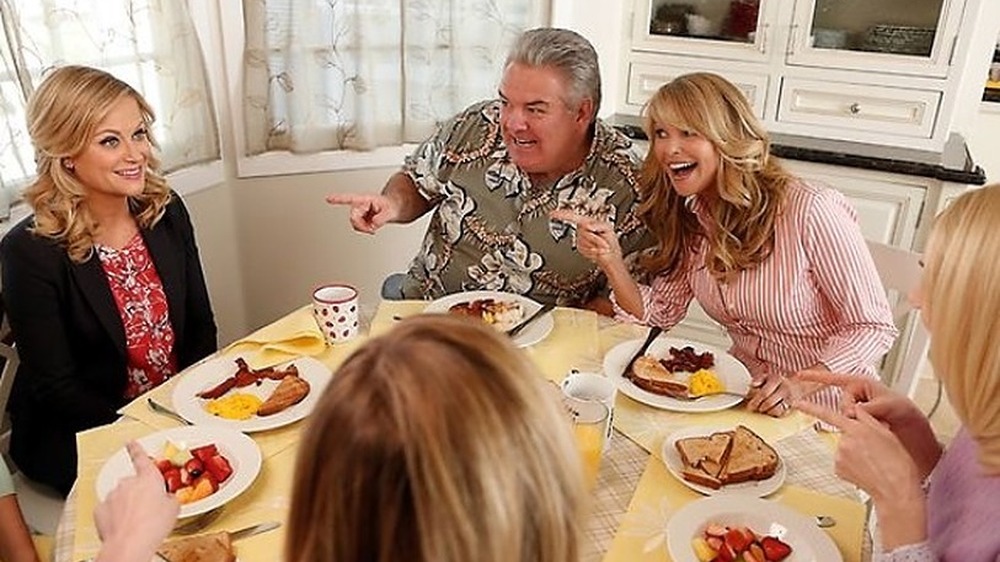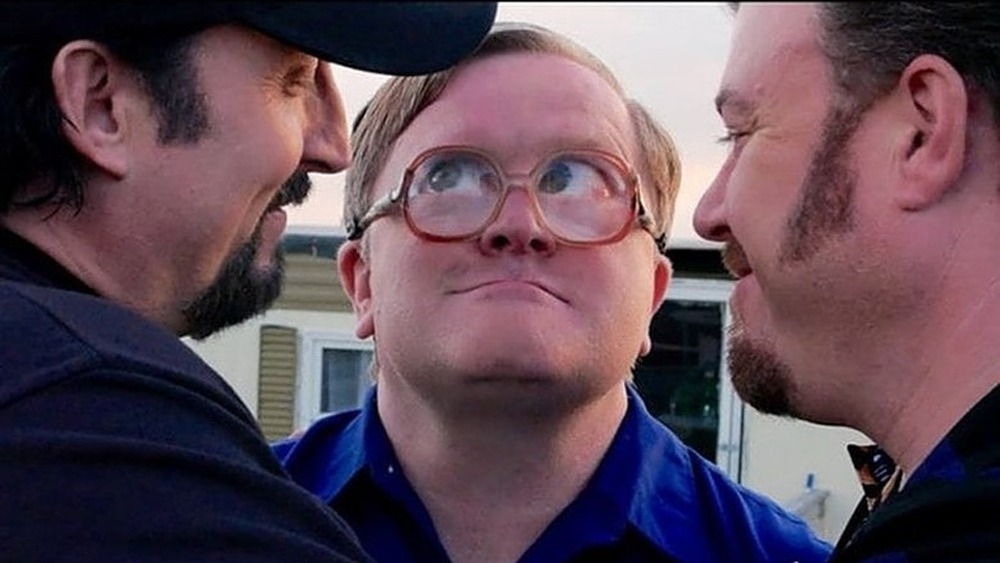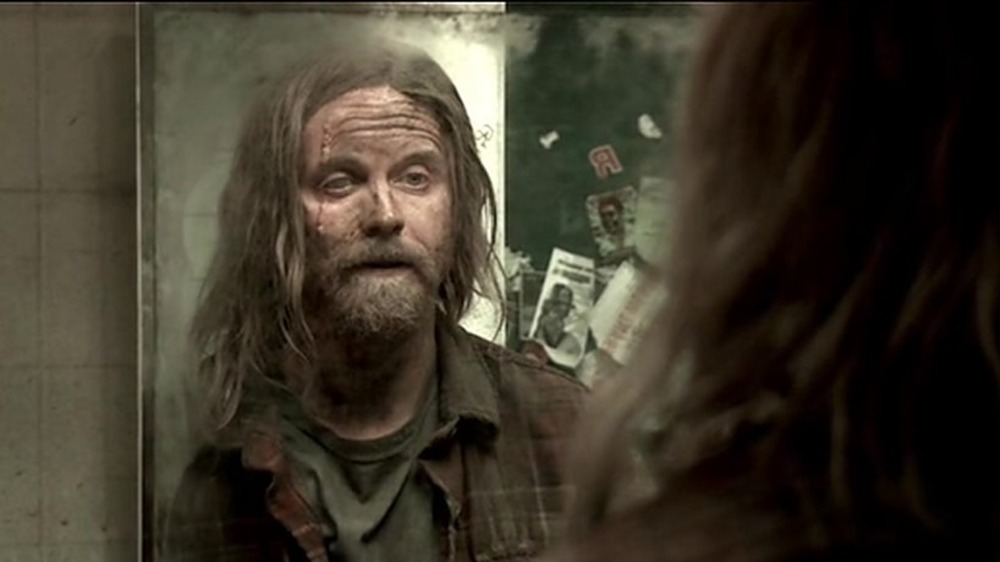Sitcom Theories That Change Everything
Situational comedies: We love them for their reliable laugh factor, consistent cast of characters, and the way they neatly wrap up a fairly traditional narrative arc in about 22 minutes each week. This style of television entertainment might not be as nail-biting as a sci-fi thriller like Stranger Things or as heartbreaking as a drama like This Is Us, but it hits that sweet spot between immensely relatable and goofily outlandish.
Or so it would seem. But to dedicated viewers, there's more to each sitcom than meets the eye. When you dive into certain fan theories, the in-depth research and analysis can turn an innocuous-looking sitcom into a philosophical metaphor, a murder mystery, or even a hallucination or a dream.
There are plenty of theories out there that don't hold water, of course. Not every Easter egg necessarily connects to a wider conspiracy, as much as you might like to believe that a character from your favorite sitcom might be the Witness Protection Program alter ego of a character from your second-favorite sitcom. Sometimes, though, theories come full-baked, and all of a sudden the story becomes so much more expansive. Here are some fan conjectures that will blow your mind.
The Good Parks
The theory that Parks and Recreation and The Good Place are in the same universe would be pretty bad news for the many morally devious (or at least questionable) characters in the former series. Both comedies were created by the inimitable Michael Schur in 2009 and 2016, respectively, and aired on NBC. Parks and Recreation actually originated as a spin-off of The Office.
But Parks and Recreation soon distinguished itself from The Office by heading in its own direction — and that direction might lead to The Good Place. A Twitter user pointed out that Eleanor's issues of Celebrity Baby Plastic Surgery Disasters, her (fictional) favorite magazine, feature two overt references to citizens of Pawnee: an ad for Glyde cologne by Dennis Feinstein, and one for a champagne by Jean-Ralphio. Think it could conceivably be a different Jean-Ralphio? The product's slogan ("Turn that frizown upsidizity," a classic Ralphio-ism) should put that protest to rest.
There are other hints, like the greasy, heart-stopping Paunch Burger, a Pawnee staple, which also appears on a menu at the Cowboy Skyscraper Buffet in The Good Place. If these shows really are in the same universe, the Bad Place demons should be drooling over the prospective arrival of Feinstein and Jean-Ralphio (not to mention the entire population of Eagleton, of course).
Malcolm in New Mexico
There has long been a fan theory that Walter White from Breaking Bad went into the Witness Protection Program and became Hal, Malcolm's father in Malcolm in the Middle. Both of these characters are played by Bryan Cranston. But if the shows are connected, it actually makes way more sense, one Redditor pointed out, to reverse the theory: Breaking Bad is a sequel to Malcolm, whose titular character grew up to be Walt.
First of all, there are tons of extended family and childhood friends who know Hal in Malcolm in the Middle. Are they all a part of his cover? Not likely. Hal and Walt have polar opposite personalities, but Walt and Malcolm are both selfish, intelligent, manipulative, and stubborn. Both are great at devising intricate plans and talking their way out of bad situations. Malcolm has chemistry experience as well. Walt looks like Hal because he shares his genes: He's his son.
So why the name change? Malcolm's last name is never stated (and intentionally obscured at times, to the point that the writers joke about it). The writers had planned to omit it completely, but Francis' name tag says "Wilkerson" in the pilot. It's updated to "Nolastname" explicitly in the finale, in line with the original plans. As for his first name, Hal's father's name is Walter, so it's conceivable that it could have been given to Malcolm as a middle name that he adopted later in life, as many people do.
Homer's coma
The Simpsons is one of the greatest shows of all time, which is really saying something for a show whose main character may have been unconscious for 20 years.
Wait, what?
It's a popular theory that Homer Simpson has been in a coma ever since the 1993 episode "So It's Come to This: A Simpsons Clip Show" — which happened six months after God suggests to Homer that he'll find out the meaning of life only after death, but it will just be a six-month wait. Premiering on April Fools' Day, the episode may have been the start of one of the longest-running pranks of all time.
This theory would explain why the characters never age, despite other indications of time passing, like birthdays and flashbacks to youth. It could even explain why so many celebrities began making cameos on the show. The coma theory posits that they're the subconscious manifestation of outside stimuli: a Lady Gaga song plays on the radio and she appears in Homer's world, or a hospital visitor talks about a new Mel Gibson movie and suddenly he's featured in an episode.
Taking place in Homer's imagination could explain The Simpsons' increasingly bizarre storylines. While there have always been some wacky plots, after 1993, the outlandishness skyrocketed (sometimes literally, like when Homer went to space). Whether or not the theory is true, we can't wait to see what the writers (or Homer's mind) will come up with next.
The Strangler angle
Everybody hates Toby from The Office, and it doesn't seem like he's ever really done anything to deserve it. Or has he?
We see hints at his tendencies when Michael calls him the silent killer and Toby replies ominously, "You'll see," or when Toby states that he's going to kill Clark for being annoying in an extended cut of one scene included in the "Making a Strangler" video.
The theory that Toby is the Scranton Strangler has been around ever since Toby became a juror on the case and made it his entire personality. He'd talk about it to anyone who would listen, and anyone who wouldn't. Why is he so obsessed?
After the conviction of George Howard Skub, Toby was wracked with guilt, saying the wrong man had gone to prison. He even visits Skub in prison to confess his regret. Skub wrings his neck, which seems to confirm that he's the real Strangler — or does it? What if he just reacted angrily because Toby confessed his own guilt of the crimes Skub went to prison for?
The Strangler is first mentioned when Pam is giving birth to her first child. Toby has been in love with Pam throughout the series. Could seeing her start her own family, rendering her fully out of reach, have triggered his homicidal tendencies?
A grave mistake
The controversial finale of Seinfeld has been dissected relentlessly. Long story short, the main characters go to jail after a trial in which their enemies over the years testify against them. Sounds like some crazy stress dream, right? Most viewers and critics, whether they liked the episode or not, seemed to agree that it felt a bit off.
Vulture described the series as the most Kafkaesque show on television, with the bizarre and illogical qualities of a nightmare. In keeping with this analysis, some people thought the finale was Seinfeld at its absurd best — but others just saw it as off-key. Jerry Seinfeld himself sometimes questions the episode.
One possible explanation for why it was all so weird? They didn't actually survive the near-plane crash in the first part of the finale, and the quaint town in which they emergency land is actually the afterlife, which is where the trial really takes place.
The case is pretty good: The trial (and punishment) for breaking a Good Samaritan law is far more extensive than it would be in real life, suggesting that this judgment is an eternal one considering their entire existence (hence the ludicrous parade of largely unrelated witnesses). Their one-year sentence is purgatory, where they must relive their mundane, morally bankrupt lives...like when Jerry and George begin the exact same conversation they had in the pilot.
How I misled your mother
Barney and Ted have definitely been rivals for Robin's affection throughout How I Met Your Mother, which, although Ted denies it when his children call him out, is less a story of how he met Tracy and more a story of how he gets back together with Robin.
One major obstacle to doing so would be Barney, Robin's former husband. He and Robin were an electric pair, seemingly perfect for each other, and really only broke up because of Robin's job. If anyone should be getting back together with Robin, it should be Barney, right?
Unless, of course, Barney was a total scumbag. According to Ted's telling alone, that's exactly how he comes across — even his proposal to Robin involves lying to her and making her cry. Not to mention that he's utterly deplorable to women throughout the series.
But some fans think it's not that simple. If Ted wanted his kids' approval to date their Aunt Robin after their mother died, he'd want to make it seem like a match made in heaven. It couldn't seem that way if she had a better match out there, so Ted intentionally painted Barney as way worse than he actually was. That is so against the Bro Code.
A state of bliss
It's hard to be a high schooler. Just ask Zack Morris from Good Morning, Miss Bliss, which aired on Disney Channel for two years starting in 1988. But don't ask Zack Morris from Saved by the Bell, the 1989 NBC spin-off of Good Morning, Miss Bliss: That kid has got it made.
These two Zack Morrises are seemingly the same person. They're played by the same actor and have many of the same acquaintances. But in most other ways, they are very different: The former's parents are divorced, his teacher constantly foils his troublemaking, and he's got girl problems. The latter has happily married parents, is the most popular kid in school, and can pretty much get away with anything.
The former Zack Morris on Good Morning, Miss Bliss went to middle school in Indiana, and there's no explanation as to how he, some of his friends, and his old principal all ended up in California for the latter Zack Morris' high school career in Saved by the Bell.
Well, there's no official explanation, anyway. But fans think they may have cracked the code: Saved by the Bell is a fantasy in Indiana Zack's mind. Disillusioned with his unhappy life in suburban Indiana, he imagines another one in California. The theme song's lyrics about a miserable student's life don't seem to relate to the show because they actually describe his real existence back in Indiana.
Bel-Air and the man upstairs
Over two thousand Redditors agree that it's possible Will from The Fresh Prince of Bel-Air was killed as a child on the basketball court in West Philadelphia. The "one li'l fight" referenced in the theme song that scared his mother into sending him away to live with his aunt and uncle in Bel-Air? Maybe that fight killed him, and his aunt and uncle are deceased relatives. He only gets to see his parents on special occasions because those are the days they're visiting his grave.
That's why, when he whistles for a cab to take him to his new home, he remarks that the cab has a strange or rare quality to it, but quickly says, "Forget it," and heads out toward Bel-Air. The rare quality owes to the theory that God (or an angel) is the cab driver taking him to live in a mansion, which a kid might think of as heaven on earth. In the "kingdom" referenced in the song (but also in God's kingdom), he's a Prince. Ascending into heaven is definitely a way of getting your life "twist-turned upside down."
The show's full theme offers some extra fodder for the theory. If Will is actually dead, the events of the show then involve him working through his issues and coming to terms with his death.
Filling in the gaps
There are 5,000 people in Letterkenny. After nine seasons, you'd think you would know just about all of their problems, but the inhabitants of this small Canadian town could still have plenty of secrets.
Take Wayne and Katy. Where are their parents? Why is Wayne so well-established at such a young age? And why do they refuse to celebrate birthdays?
It might be because they're former Mennonites who never returned to their community after their gap year. We don't see their parents or know their last name because they've been shunned by their family, after which they were taken in by their Uncle Eddie, who gave Wayne his farm before moving to Florida. Wayne is upset by the way Katy dresses because of the conservative beliefs he was raised with, and the pair are obsessed with nonreligious holidays and celebrations because they symbolize forging their own lifestyle and traditions.
The Dycks — the show's most prominent Mennonite family — steer clear of pop culture and thus tend to make some pretty embarrassing double entendres every time they open their mouths. Wayne and Katy are so far the other way that it could even be compensatory: They delight in wordplay and allusion, sometimes carrying on conversations entirely in idioms.
It's looking funny in Philadelphia
Though it purportedly takes place in Philadelphia, TV's soon-to-be-longest-running sitcom It's Always Sunny in Philadelphia is actually set in some warped, absurd version of reality, according to fans. Perhaps it's taking place inside the twisted mind of one member of the gang, as suggested in "The Gang Does A Clip Show." But if that's the case, whose reality is it?
Many fans (and even Jimmi Simpson, who plays Liam McPoyle on the show) think that at the end of the series, we'll get at least a partial answer when the showrunners reveal that Mac, Dennis, and Dee don't look anything like the actors who play them. We see them as they see themselves due to their delusionally inflated egos (Charlie and Frank don't suffer from the same delusion because they're perfectly OK with their weird selves and, on top of that, have found acceptance in each other).
Think about it. Dennis is supposedly attractive, but must resort to elaborate measures to get women. Mac's character is portrayed with big arms, but he never succeeds in combat or intimidation. Dee is played by a beautiful actress, but only dates men who are in some way misfits themselves. This is because Dennis is actually extremely ugly, Mac is scrawny, and Dee still suffers from severe scoliosis and is confined to a massive back brace.
Sitcom vs. cosmos
The theme from The Big Bang Theory covers the entire history of time, from the creation of the universe until the present day. One theory posits that this is a clue to the show's true premise: It's actually a history of the universe, told from the vantage point of the very end. The details of the show, Cracked observes, make it a real-time record of modern science, with generally accurate depictions of equations, theories, and principles.
If the show is truly a depiction of the actual big bang theory, one thing is inevitable: According to that very theory, the universe will eventually stop expanding and contract again, and everyone will die in The Big Crunch. (But don't expect a sequel series called The Big Crunch, because like we said, everyone will be dead.)
Leonard, Sheldon, Raj, and Howard are the Teslas and Einsteins of our time, but the series shows us the seeds of their downfall: Instead of applying their genius, they spend their time goofing off, reading comics, and going girl-crazy. That's because the Big Bang Theory guys will actually bring about the apocalypse — or fail to prevent it from happening because they're busy with sitcom-level challenges.
Affair point
The internet is full of articles about how inappropriate the relationship between Ross and Monica Geller on Friends can be: It's been called creepy and icky, and they've even been accused of forgetting they were siblings. But this might be a lot easier to understand if Monica and Ross weren't actually full siblings after all.
And if Monica were the product of an affair on the part of her mother, it would also explain why her mother seems to hate her so much: Monica is a constant reminder of her transgression.
It's also been proposed that the two are brother and sister not because their characters were designed naturally with this relationship in mind, but because the writers had no choice but to make Monica and Ross siblings. Otherwise, the friend group wouldn't even exist because everyone (or almost everyone) would have sided with Carol in the divorce. Ross has few redeeming qualities, so only a blood tie could save him.
How I became a father
Remember the theory about Ted misleading his children about Barney's character in How I Met Your Mother? Let's say that, even if it was a little embellished, there was at least a pinch of truth to this narrative. Maybe Barney really did have a long list (or a scrapbook) of women he'd slept with: It might not have been over 200, as Ted suggested, but it could have been pretty substantial, because maybe — just maybe — Barney's been trying to have a baby the whole time, but struggles with infertility issues that give him a less than 1-in-200 chance.
It seems unlikely that he could sleep with as many women as he supposedly has without getting any of them pregnant unless he had fertility problems. This would also explain why he was so accepting of Robin when she opened up about her own infertility. Robin was both unable to have and uninterested in having children. The same wasn't true of Barney, who did want to have children eventually; if not biologically, then through adoption or surrogacy. This was the reason, according to one theory, the pair eventually split.
The anonymous "Number 31" whom Barney eventually got pregnant could have actually been a mother in a closed adoption whose name he was legally barred from revealing. It's a much more wholesome interpretation of Barney's entire story, and it fits with the character's affinity for deception and his secretly soft heart.
Talking heads
As lovable as they are, the three families on Modern Family certainly experience a fair share of dysfunction. Through the regular talking heads, which feature individuals and partial ensembles of the Dunphys and their relatives, we get a deep window into the psyche of each family member. These glimpses often revolve around significant moments in their lives, like graduations, pregnancies, and weddings. Such moments are exactly the kind of recollections that would feature most prominently in someone's memory of their life, and would be of special importance if the family was explaining their backstory to a therapist.
There's certainly enough dysfunction to prompt at least one person in the family to seek help and encourage everyone else to participate. The Reddit theory also points out that, unlike other mockumentary-style shows, only the family members are interviewed on Modern Family, rather than additional characters from various plotlines. This, along with how personal they get in their interviews at times, suggests that they're seeing a therapist to discuss issues within their family, not filming a documentary about their lives as a whole.
When it hasn't been your night
Everyone knows that Rachel getting cold feet and deciding not to marry Barry is what kicked off the show: Rachel showed up to Central Perk in a wedding dress, Monica recognized her from high school, and she was adopted into the gang (and Monica's newly vacant apartment) after she revealed that she'd just left Barry at the altar and had been cut off financially by her father. Rachel's decision launched one of the most iconic sitcoms in American history.
But one theory proposed by Twitter users suggests that while this is still true, it didn't happen exactly the way the series portrays. Rachel didn't want to marry Barry — but the entire plot of Friends is just a stress dream she has the night before her wedding, the escapist fantasy of a soon-to-be-trapped housewife.
This theory goes back to the season 4 DVD cover, in which all of the other Friends are asleep, and Rachel is the only one awake. Fans believe this little detail wasn't accidental, and that it points toward the true nature of the entire story.
Oh, brother
The narration in Arrested Development is almost never coincidental, containing layer upon layer of wordplay and suggestion that often revolve around the show's bizarre themes and ambiguity around biological relationships. One theory expands on this pattern to propose that Michael and George Michael are not father and son, but brothers sired by George Senior.
Ron Howard himself stated in the show that Michael "always wanted to think of himself as that kind of good guy — the kind of guy who would raise someone else's child." Howard, as a character, also reveals that season 4 is really about the relationship between Michael and George Michael. Michael then comments, "I wouldn't even think of him as a brother." Michael also frequently says of himself and his son, "We're just like twins."
Critically, the theory notes that it's suggested again and again that Rebel in season 4 is a duplicate of Michael's late wife, Tracy. In many ways, the story is a duplicate, too, perhaps more so than we realize: Michael is sleeping with his son's girlfriend, and perhaps George Senior did the same and fathered George Michael all those years ago. The theory goes on to suggest that this is why George Senior was caught wearing Tracey's maternity clothes in the attic, why Ron Howard suggests that his illegitimate child might be an offensive topic to bring up in front of Michael, and why George Michael is named George Michael.
The one thing Garry never spilled
Garry Gergich from Parks and Rec may have his marbles full of mouth, but his mind is full of mystery — at least if one fan theory, which actor Jim O'Heir himself tweeted about, is correct and Garry is, in fact, a sleeper agent. He's certainly no stranger to changes in identity, having cycled through at least six first names and two last names over the course of the show.
Maybe it doesn't seem possible that the oaf could be a successful agent of espionage. Remember, though, that Garry is a highly skilled human being who's only clumsy at work (and maybe deliberately so, to deflect suspicion). He has a wide range of talents, from piano to painting, that could be leftover acquisitions from previous cover stories. And he gets very nervous when his coworkers try to dig up dirt on him, even as part of a game.
This theory would also explain his bizarrely perfect family, who are so in sync it's like they were trained (or threatened) into being that way. He may have spilled every drink or bowl of soup he ever touched, but Garry never spilled the beans on his secret mission.
Trailer Park Freuds
According to Freudian psychoanalysis, there are three main parts of the human personality: the id, which rules basic primal desires in the absence of concern for right and wrong; the ego, which brings the id down to earth and forces it to engage with the constraints of reality (aka common sense); and the superego, which governs morality and values.
On its surface, the protagonists of Trailer Park Boys might seem uncomplicated, but the dynamic of their collective neuroses represents the three foundational parts of the Freudian psyche, and these roles drive many of their plots.
Ricky is the id: He has no objectives or sense of responsibility, only seeking the next source of immediate gratification and following his whims with little remorse when he screws up others' lives. That is, until Bubbles (a character that has quoted Plato) begins making him feel guilty. This is the function of the superego: to "call you out on your crap" and try to put you on the right track, as Bubbles does when Ricky comes up with a criminal scheme or interferes in Bubbles' own plans. Caught between the two is Julian, the ego, who often bears the brunt of Bubble's strong reactions to Ricky. This dissonance between the three is the basis for a lot of their drama.
The Gang sells their souls
It's been fairly well-established that there's something surreal about It's Always Sunny in Philadelphia. From its Inception-like clip show episode to the bath salt zombie outbreak at Maureen Ponderosa's wedding, the show borrows from and satirizes other genres, literary tropes, and all manner of material that takes it beyond the realm of an everyday sitcom.
And there may be a secret allusion to classic literature in the unfortunate character of Rickety Cricket, who could very well represent the Gang's Picture of Dorian Gray.
When we first meet him, he's reconnecting with the Gang after becoming a priest. Each misfortune he suffers thereafter is a direct result of the Gang's influence: He leaves the priesthood, becomes homeless, develops debilitating drug addictions, has his legs broken, gets his throat slashed, has one eye blinded, and eventually gets mauled by a dog before finally having one side of his face horribly burned. Like Dorian Gray in Oscar Wilde's novel, the Gang remains oblivious to the consequences of their own actions. Cricket instead serves as the vessel that records every sin in gruesome detail — just as the picture of Dorian Gray grew more horrible in his place.
